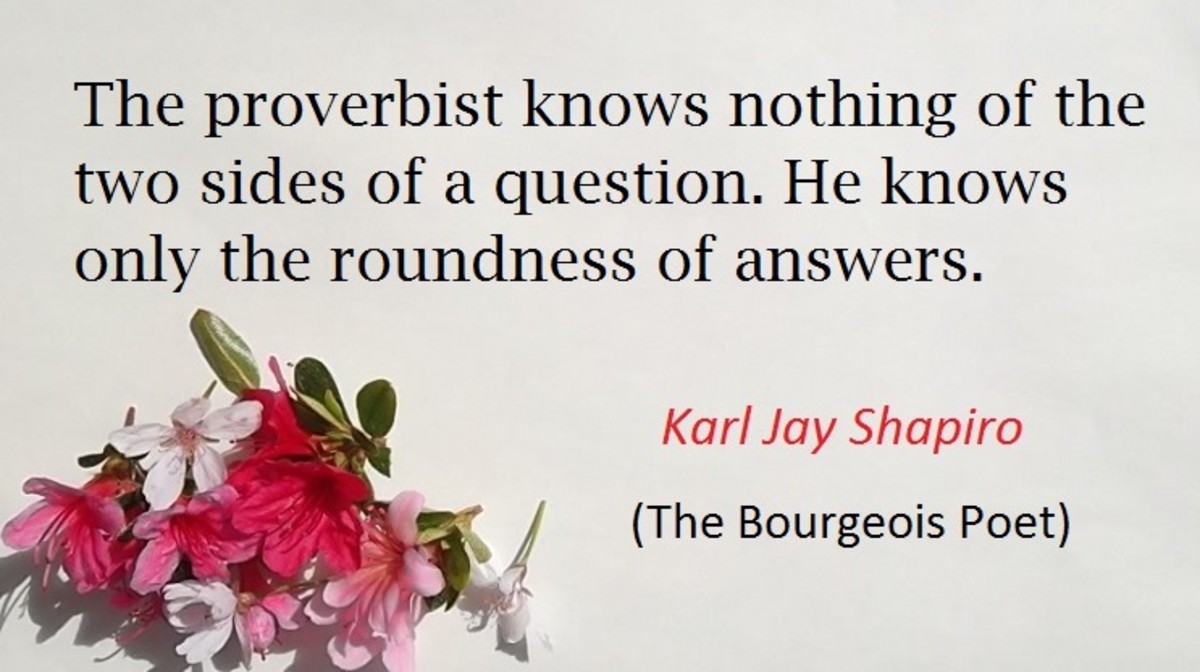Inspirational Quotations by Jewish Authors #6
Motivational Quotations
TOPICS: Perseverance (Persistence); Personality; Planning; Preparation; Resolutions; Self-Confidence; Self-Esteem; Self-Improvement; Self-Inventory; Success; Time; Vision; Wishing; Work.
PERSEVERANCE, PERSISTENCE
There are people who cannot distinguish between persistence and pigheadedness and who pride themselves in the inflexibility of their decisions and viewpoints—all oblivious, perhaps that they do not hold opinions—opinions hold them.
Stubbornness is unreasonable—and a big or broad man or woman is always reasonable, manifesting this reasonableness in being always open to conviction.
Perhaps the best definition of stubbornness is that given by an Italian philosopher who said of a man much in the public eye and ear:
“He prides himself on his stubbornness unknowing that stubbornness is but the strength of smallness.”
---Herman J. Stich, The Daily Star, Long Island City, N.Y., Nov. 22, 1922.
PERSONALITY
Let us reflect for a while on the reality of Thought as the essential quality of life. The real you, my friend, is not so many pounds of flesh, blood and bones reading this article. Your body, after all, is the shell which contains your spirit, the vehicle for your invisible soul. To be sure it is a sacred thing, a holy vessel of the spirit which you must care for.
Undoubtedly your body is a responsibility--you have to feed it and wash it and clothe it; you have to clean its teeth and brush its hair. Every now and then it ails and you have to give it medicine or through surgery repair some damage. But the real you is not the body, although manifestations of what is really you are seen in the way you take care of your body.
Sometimes you make the mistake of believing that if you dress up the body beautifully and make it attractive you will prove that you have a beautiful soul. Sometimes, like the legendary character of Narcissus, we fall in love with our own appearance and become very vain so that our whole life is a matter of vanity and a passion for personal adornment. This, too, is a futile pursuit, for the soul of man is greater than all this and is not at all dependent upon outer appearance for its inner grace.
The real you is a combination of your thoughts, your memories, your ideals, your faith, your fears, your beliefs and doubts, your loves and hates. The higher your ideals, the purer your faith, the greater your love, the more do you come closer to that spiritual achievement and spiritual height which releases you from bondage to those earthly values which are no more of passing significance. This soul of yours is the eternal part of you, the immortal essence of your being.
—Hyman Judah Schachtel, Houston Post, Houston, Texas, Sept. 18, 1954.
PLANNING
The man with a plan usually wins. It can be for good or evil. Defeat in human enterprise of all kinds is often due to a lack of a carefully thought-out method of achieving the desired objective. How frequently does an able candidate for a position lose out to an inferior applicant by virtue of the latter's planned approach. How many worthy projects have failed to attract support because the advocates of the measure have overlooked the supreme importance of following a step-by-step logical process which persuades and convinces others of the merit of the project. The same holds true on communal, national and international levels. Destructive and evil designs can and do overwhelm the public, if these are presented ably and compellingly, while constructive and benevolent programs don't have a chance because of inadequate and ineffective organization and propaganda. It is not enough to be good, to be the best, to be deserving of success. In addition to being qualified for whatever goal you seek, you must also think through painstakingly the procedure whereby others will recognize your worth. Just to know what you want is not sufficient. Sit down with pencil and paper to plot the course of your action. Talk your problems over with others whose judgment you value. Then, after you have arrived at a plan, seek your destiny. You will find that the man with a plan usually wins.
—Hyman Judah Schachtel, Houston Post, Houston, Texas, Dec. 17, 1955.
PREPARATION
Thrift is different from economy. Thrifty people are those who prepare for the proverbial rainy day. They are the people who can look ahead and understand the shadows that have been cast by coming events. To economize means to do without—to be thrifty means to store up for the future. … We are asked to prepare for the morrow, therefore we are asked to practice thrift.
---Jessie Abrams, The Canadian Jewish Chronicle, Montreal, Quebec, Canada, Oct. 11, 1918.
What is the prepared mind? It is a mind stored with the history and fruits of human experience. It is a mind which has been called upon in the course of its education to deal with problems, now of one kind, now of another. It is a mind fitted to enjoy and to be bided by the spiritual experiences of the human race. It is the kind of preparation which will fit you to see and to grasp opportunity and to turn opportunity not to your own individual and selfish benefit but to the benefit of mankind.
—Abraham Flexner, School and Society, June 26, 1937.
RESOLUTIONS
A new year, whether religious or secular, is an arbitrary determination, but should be observed with an attitude of consecration. It signifies a new opportunity, and opportunity with God’s favor is one of man’s greatest blessings. A New Year should be entered with the determination that it shall be new in the sense of being devoted to such nobler realizations and purposes as have been taught by the experience of past achievement or failure.
An old year supplanted is naturally left with comingled feelings. No life is entirely satisfactory and happy. In this fact lies a challenge and call to renewed effort in keeping with our unexhausted possibilities.
Not one of us is without something for gratitude. Every one of us has occasion for regret. Nothing human is perfect. We may happily congratulate ourselves, however, and heighten our joy if we find that our regret is not overshadowed by remorse. We cannot avoid mistakes. We should scrupulously study to escape the blot and blight of moral defeat.
When we enter a new year it should be with the thought that our little human sphere no less than God’s larger world still holds field for further accomplishment. None of us is ever justified in feeling that we have reached out limit in any direction in which we may apply ourselves. As we grow older our powers may be less effective but as long as our ambition and our will are whole we are not wholly without result either in influence or accomplishment for ourselves and for others.
In facing another year we shall undoubtedly have to suffer uncertainty, disappointment, occasional distress and sometimes sorrow along with brighter and happier realizations. Let us never despair but keep constantly before our mind’s eye as a source of inspiration and guidance, that as long as God is in His world, as we have reason not only to hope but to believe, in due time above the storm of our daily path will bend the beauteous bow of His promise that we shall never be completely destroyed. With heart within and God overhead winged by the inspiration and aspiration of hope, let us go forward resolved to try to make the most and best of our opportunities and ours will be the constant comfort of the Divine assurance that thus disposed we may never be said completely to fail. It is not failure but low aim that determines disgrace.
---Alexander Lyons, Brooklyn Daily Eagle, Brooklyn, N.Y., Jan. 6, 1932.
What a wonderful thing it is to the courageous to know that we are, under God, masters of our destiny, captains of our soul. What a stirring thought to those who do not shirk labor and toil, that we can wrest the rewards of life from an unwilling fate if we will, and work. Not stars, not fate, not fortune--our heart and our own right hand count.
Instability and unreliability account for the failure of many of us. We are volatile; we have set no goal or aim; our morals are not fixed; we cannot succeed. The world does not give its great tasks to undependables; it does not trust itself to the man who halts between right and wrong. All about us is the flotsam and jetsam of those poor crafts that were wrecked because someone thought he could sail the seas of life without a rudder or compass or chart.
The same fate overtakes those who lack self-control and become instruments of violence, letting their passions, their hates and their anger rule them. They are the merest lay figures in life, moved and played upon by the gusts of self-indulgence. And those who desire to life at east will ever be beasts of burden, for the world demands payment before the east of success comes. Those who will not work and sweat for success join the numerous caravan of those mediocrities who leave little or no trace of themselves among life's highway. Those who take the easiest way and keep on compromising never will mean much in this world of ours.
But success, real success, full success, comes to those who are born fearless and loving; to those who face life with the smile of courage and hope; to those who think long and intently upon life to understand and to pray. Who bears the scepter? Who are they from whom whose loins come the deciding factors of a community or a civilization? Those who are so sure of God that no darkness in this world of ours causes them to run in panic or to compromise with evil or pathetically break apart, as so many are doing now. Those who so constantly walk with Him that they love honor and truth and mercy as the very light of His countenance. Such are the men and women who succeed in the truest sense, even though they display their completest self and live out their fullest life, self-controlled in success and crowned with fortitude when failure is their lot. Others may be called successful because they hoarded much gold: but if in addition to that they live cramped, panicky, rabbity, fearsome, puny lives, they are the most futile people in the world. How little they know of life's satisfactions.
Work with a will and with honesty, hope and a persistence that will paint the rainbow on the scene even while you gaze on the foreground of it, and will give you the fortitude and the courage to go on and bear your burden yet awhile for soon the better day approaches, and then all the time have faith that God is not dead, that while He punishes us for our trespasses, He makes the sunshine to smile upon us once we turn out of the lane of the thorns we ourselves had planted; let faith keep your spiritually tuned up to meet life without stumbling over extravagance and selfishness and of destroying looseness of our moral fiber, which have come upon this age of ours as the veritable brood of unbelief and cynicism. Onward then and usher in the circling year with the will to work, with shining hope and with abundant faith, greet the new year with a glorious cheer--and the gray ashes of defeat will be transformed with God's help into a radiant garland of glory.
—David Lefkowitz, Dallas Morning News, Dallas, Texas, Jan. 2, 1933.
All men frame good resolutions. There is not a human being without them. It is in carrying them out where the problem of life is contained. When good promises are not identified in resulting conduct, better by far if they had never been made. All the criminal codes in the world tell only one pitiful story--how promises have not been kept. But let only good resolutions lead to corresponding deeds, and our life would become untainted, pure, unflecked, as clear as the blue of the heavens, as light and sweet as the summer breeze. It is when our fine promises take wing and are forgotten that the heavy clouds begin to darken our days, and the thunderstorms to bring ruin and downfall. Resolutions are mere air bubbles when they come and go with the moment's impulse. They must be grounded on the necessities of experience if they are to have weight, stability and compelling power. Let us hope and trust that our resolutions will have that firm character.
—Charles A. Rubenstein, Arkansas Gazette, Little Rock, Ark., Sept. 25, 1892.
Facing the New Year enchants us with the possibilities of new experiences and new satisfactions. We make resolutions and assure ourselves that in the year ahead our dreams will come true. That hope which "springs eternal in the human breast" seizes us completely and we indulge our fondest anticipation.
Then, when the midnight hour strikes heralding the birth of another milestone in time, we stand tiptoe with expectancy. It is as if mysterious forces were uniting themselves to our souls and with utter credulity we are certain that "the best is yet to be."
But the New Year cannot bring us our fulfillment just because it is new. There is more to progress than a change in date. Growth of mind and soul demand discipline and decision and sacrifice.
Happiness, to be realized, requires much more than an ecstatic greeting, and the wish for it exclaimed among friends on New Year's Eve. Not that wishes are folly and hopes are vain. These are, in their way, a form of prayer. But we must line work to wishes and perseverance to hopes if these prayers are to be answered.
Ask of God in the New Year, anything you please. Ask for health, for prosperity, for contentment, for peace. Ask for love and beauty and courage, Yet, never forget that you must do your part. You and God form a human-divine partnership. He never fails--will you?
—Hyman Judah Schachtel, Houston Post, Houston, Texas, Dec. 31, 1955.
SELF-CONFIDENCE
Confidence creates an unquenchable faith. Faith creates confidence which braves conflict and instills determination which cannot but spell victory. Self-confidence is a fountain of everlasting force and hope. It is self-confidence that is the driving power, the fuel of success.
---Herman J. Stich, The Evening World, New York, N.Y., Nov. 1, 1919.
SELF-ESTEEM
In making an impression do not make it too deep—for it may cut through.
---Sophie Irene Loeb, Washington Times, Washington, D.C., Jan. 2, 1913.
SELF-IMPROVEMENT
Not what we remember but what we become is the only test.
---S.H. Clark, The Acorn, Ogden, Utah, March 1907.
To stand still is to stagnate, but the other extreme carries its penalties. You are always looking forward to the day when you have accomplished this, that or the other thing, and you say to yourself, “Ah, THEN is the time for me to stop and really ‘live.’”
And how you fool yourself, because you are trying to fool Father Time—a losing game. For he has had thousands of years ahead of you and thousands yet to come.
The man who knows how to get something out of life AS HE GOES ALONG in his work and in his play is the richest man of all.
There is something to live for besides the dollar mark and the high position.
And that is life itself in the everyday.
---Sophie Irene Loeb, The Evening World, New York, N.Y., March 30, 1915.
Man in and by himself or even aided by other human agencies cannot measure up to the complete possibilities of his conduct. He requires the lift or the leading of some power outside himself to which he must be subject and subservient beyond the possibility of successful evasion. This is to be found in the compelling consciousness of the conviction of man’s origin as a creature of God and as a co-worker with God.
What a fine illustration of the potency of the divine urge in human life we have in the life of Jacob in the Biblical story. Jacob began his career unpromisingly. It presented a number of seriously threatening aspects. And yet, from the time of his dream his steps took a slow but sure upward tendency as a result of the coming into his consciousness the thought of his subordination to the Being Supreme.
I am certain that Jacob’s mother to whom he was particularly close was a source of that leaven in his life that subsequently stirred in him his nobler dormant possibilities. A mother who consciously or unconsciously brings to bear upon her child the mystic influence which implants the seed of a future recognition of human responsibility to divine compulsion wields the greatest power that can be brought to bear upon human improvement. … Motherhood should be a channel through which the light of heaven should come to guide and guard the needy footsteps of God’s human children. To my mind a good mother comes nearest to what our best fancy conceives God to be.
---Alexander Lyons, Brooklyn Daily Eagle, Brooklyn, N.Y., Nov. 19, 1934.
If you knew all the fact you most likely wouldn't want to trade places with anyone else in the world.
Nevertheless, so often when we are frustrated or when we suffer some misfortune, we look enviously at somebody else and wish that we could be living that other person's life. What we overlook is the truth that every life has its problems, its pains and its sorrow, its triumphs and success. Every life has its high moments, as well as its moments of despair. If you were to know all the facts about the life of that person you envy, you would conclude by being quite satisfied to keep what you have and to remain what you are.
While it is quite natural to seek some way out of our distresses, even if it means wishing we were somebody else, it is only part of the weakness which overcomes us at a particular time because of adverse circumstances. It is one of the ways in which we seek to escape from our problems, a kind of day dreaming, a method of flight from reality. It is also a way of feeling sorry for ourselves.
It is far more healthy to cultivate the sense of being glad that you are what you are and to make the best of what God has given you. For all you know the person whom you envy would wish to be anything else but what he is. Moreover, were you to match your blessings with his, yours would probably be much greater and your troubles far more insignificant.
—Hyman Judah Schachtel, Houston Post, Houston, Texas, Sept. 25, 1954.
SELF-INVENTORY
What is more difficult than self-knowledge? And yet who can know better than our own selves the particular weaknesses and backslidings to which each of you is, in one degree or another, liable? It is impossible for anyone to perform for you the task of self-examination.
—Max Heller, The Daily Picayune, New Orleans, La., Oct. 9, 1905.
SUCCESS
Do the thing you think is best and abide by it like a soldier.
---Sophie Irene Loeb, The Evening World, New York, N.Y., Dec. 30, 1913.
To stand still is to stagnate, but the other extreme carries its penalties. You are always looking forward to the day when you have accomplished this, that or the other thing, and then you say to yourself, “Ah, THEN is the time for me to stop and really ‘live.’”
And how you fool yourself, because you are trying to fool Father Time—a losing game. For he has had thousands of years ahead of you and thousands yet to come.
The man who knows how to get something out of life AS HE GOES ALONG in his work and his play is the richest man of all.
There is something to live for besides the dollar mark and the high position.
And that is life itself in the everyday.
---Sophie Irene Loeb, The Evening World, New York, N.Y., March 30, 1915.
Picture life as a colossal game in which each one of us has been given by God a particular part to play. View life as a game, so as to get the greatest amount of joy out of it. Suppose, then, we so view life, and let us see what such a view implies.
It implies first that we play the game fair. Each one must do his own part diligently; must be able to do teamwork by cooperating with others, but above all, he must play fair, and not take undue advantage of others in the game. We shall win out in life’s battle if we observe the rules of the game. The first rule of our life should be that of fair play. It is not the winning of the game that should count with us, as the playing of it fair. When our life is ended, we shall want to have it to our credit that we have played a clean game. There will indeed be times when it will seem as if it is only by foul play that life’s most coveted prizes can be gained. But make no mistake about it. The Captain, whose all-seeing eye scrutinizes every action, he reserves the highest rewards only for those who play a straight game. For life is more like that game the ancient Greeks had. It was a race into which the athletes entered with lighted torches—and the winner was not he who reached the goal first, but he who reached the goal first and at the same time had not allowed the light of his torch to become extinguished. So the winner in life’s race is not he who reaches the goal that perhaps the world co vets; but he who has not permitted, in the hurry and scurry of the chase for gain, the light of principle, the lamp of conscience to be blown out. That is the rule that our Captain has laid down to govern the game of life. And must better were it for us to go down losers in the sight of men, than to come forth losers in the sight of God. When one of our sages of old was confronted with temptation, he declared, “Much rather would I have people call me a fool all my days than I should appear wicked in the sight of God even for only one hour.” So will there, no doubt, be people who will call us fools if (when the opportunity offers) we fail to grasp by foul means riches, power or position. But rest assured that the only prize in life really worthwhile gaining for us and handing down to our children is the “crown of a good name” that can only be obtained by playing the game fair. Therefore face life, and play the game, but mind that you play it fair.
Then there is this further rule to observe. Play your own part of the game as best you know how, but unless you want to make a failure of your life, do not attempt to play a part that was never intended for you. Many of life’s tragedies arise from pretending to be what you aren’t and were never meant to be. … We are so often afraid to be our own true selves. Often do we try to be what we were never meant to be, try to do what we are not called upon to do; try to go where we do not belong, and find ourselves out of place. The trouble with this type is that he is not a genuine article, that he is not an honest product, for he deserts and refuses to play his own part of the game, and tries to play a part for which nature never intended him. Now the only way properly to play the game is not by being halfhearted, half-baked, or half-formed but by being always upright and outright, professing and practicing one’s faith in the open, and without obtruding, yet never being afraid to show [his true] colors. That, too, is the only way that we shall gain the respect of our neighbors. For that, too, is the part of the game that they expect us to uphold, and nothing probably will so disgust them as to see us try to play their part of the game, of which they can mighty well take care themselves. Would anyone with any spark of nobility in his heart want to desert the principles of his faith? To play the game nobly, bravely, honorably and in a matter to bring credit to ourselves, for only thus shall we win the respect of other people and gain peace of soul for ourselves.
Another principle to observe in the game of life is to be a generous winner. It is so natural for the winner to attribute his success to his own ability, skill and foresight. So also in life when we achieve material success, we are apt to boast, “My strength, and the might of mine arm have achieve for me all this substance.” And as for those who have made a failure of it we are inclined to blame them, and put them down as unfit for life’s strenuous struggle. We forget that life is a game, and as our sages put it, this world is a wheel that keeps forever revolving, and those of us who are raised high on it today, may tomorrow be brought down very low. Nor is it a wheel of chance, but it is God who turns it; and therefore when He has raised us high, it behooves us to be grateful to Him, and to show ourselves generous to those who have not been as fortunate. It is our opportunity to prove to the world that we are not in the game of life for its paltry winnings, but for the amount of good we can accomplish with them. Therefore, do not in a small miserly way pocket all our winnings; but show yourself generous, and treat the losers also to some of the plenty that the fortune has brought you. Set your winnings to work, in the upbuilding of the world; the uplifting of mankind, and in establishing for yourself the reputation that you are a generous winner.
And if we have not been winners, then must we learn to be cheerful losers. That is a most essential rule of this game of life, if we ever expect to get any joy out of it. For we cannot expect to be winners always, In fact, there is no one who is not a loser at one time or another. There are times when we lose large fortunes. A time there is when we must become resigned to the loss of health; a time when we must face the loss of dear ones. The attitude of the cheerful loser is the one who gets the most out of this game of life. He accepts everything as part of the game. For him it is to play his part he leaves to the Captain who directs the game. Reverses do not discourage him. He knows that he is engaged in a game that takes in the whole universe, of which he is but an infinitesimal part, and that what seems to him a loss may be a greater gain elsewhere, and what today seems an evil may tomorrow prove a blessing in disguise. Therefore, does he not question what fortune brings him. He trusts his Captain, and whatever happens, he plays the game with unfaltering faith.
Finally, the only way to play this game of life is to go in for the exhilaration of the game itself, and not go in for the sake of the winnings. The pleasure of a game is always spoiled if the players are too greedy to win. So is many a life spoiled, because we refuse to enjoy the zest and excitement of the game itself, and are only bent on securing its prizes, and when we miss these also then we exclaim with disgust that life is not worth the game. The fact, however, is that life is worthwhile whether we miss its prizes or not. Life itself is so wonderful an experience, so thrilling an adventure, that we should be grateful for it even if it does not bring us many successes. “The glory of the road is not the goal but the road itself—the delight of traveling upon it. So the real joy of life is in its manifold adventures; the zest and movement of it all.” The poet Lessing once said, “If I held truth in my hand, I would let it fly like a bird that I might pursue it.” So it is for the joy of the pursuit, that we should enter the game of life, and that joy we should not miss whether the pursuit itself materializes in anything or not. For in the end it will be immaterial whether our winnings are large or small. We shall leave them behind in any case. Therefore, should we not in the meanwhile miss the zest, the relish, the joy of the game itself? In the end whether we have accumulated much or little in life, the only thing that will really matter will be whether we have played the game with a heart full of joy and directed heavenward.
With this sturdy spirit then let us face life [as it] opens before us; and let us not forget that it is a game we are playing. Then let us play it fairly, squarely, honorably. Let us play our part faithfully, bravely, nobly. Let us enter into the joyous spirit of the game and whether we be winners or losers, let us ever be of good courage and never lose faith in the Captain who assigned us the parts we are to play in the game of life. Thus, to play the game is to understand life and to live is wisely.
---Herman Abramowitz, The Canadian Jewish Chronicle, Montreal, Quebec, Canada, Sept. 29, 1922.
This day—the start of your own life—is the creation of a new world for you and for humanity. You are destined to build a new world of progress and nobility for yourself and your fellowmen. A right beginning is half the success. A careful plan of campaign is half of its victory. A problem found is half solved. And it is a maxim that the principal part of everything is the beginning. Start right.
Success and honor are your birthright conferred upon you by the all-loving Father. To every man and woman is given the right choice to accept or to reject prosperity, dignity, happiness, and immortality.
But how secure success and nobility? By following the dictates of the follow three fundamentals at the start of your career.
First, the choice of occupation. Not what seems to you a successful business that counts for your success, but what you are fitted for. Thoroughly grasp this fundamental. The unsuccessfulness of a profession is not determined by the unsuccessfulness of the profession chose; but by his unfitness for the profession. This largely explains the presence of so many sorry figures on honorable callings. Know thyself, and thyself and success are identical. Carefully and painfully map out your scheme of life endeavor. Seek the counsel of the unprejudiced expert. Above all, pray God to reveal to you your special talents. Prayer works wonders. Then choose the good that is inherent in you, and thou shalt have chosen life.
The second fundamental is the idea of mission. You are not a straw hat that is driven by the win of chance. God has sent you on earth for a purpose. Hold fast this idea in your mind. One third of your success depends on it. Humble as you may be in your own eyes or in the eyes of your brother men, to God there is no humbleness of birth, rank or station; not incapability or achievement. Realize your mission and obey its obligations and you shall surely thrive. You shall grow good and great. Feel deeply that God has sent you. …
All serious men and women have craved a master as well as a task. Some call their master “Duty.” Wiser people call their master “God.” Be of the wiser.
Mission means consecration. ‘Tis the entrance of the soul in the deeper life with God. Shun frivolity, develop the habit of serious thoughts.
Do you believe in your mission. Then one-third of your success and nobility are yours. Believe it and it is yours. Do you not believe in your mission? Then one-third of your success and nobility is lost.
The third fundamental is concentration. No concentration, no success. Your high-purposed mission cannot be accomplished without that great distinguishing faculty. Concentration is the characteristic of genius. It is the acquired ability to focus your mind steadily and seriously upon your selected calling—no greater essential to genuinely great achievement. Concentration can be developed. Cultivate cheerful interest in your work. The fulcrum of mental power is found in the convergency of your intellectual forces. ‘Tis the mother of success, and the builder of your individual world.
Remember the three great fundamentals!
---Isaac A. Hadad, The Canadian Jewish Chronicle, Montreal, Quebec, Canada, Jan. 21, 1921.
TIME
When a man tries to kill time, time often turns the tables.
---Sophie Irene Loeb, The Evening World, New York, N.Y., May 27, 1912.
There is no work any harder than the process of killing time.
---Sophie Irene Loeb, Washington Times, Washington, D.C., Dec. 31, 1912.
"What is time?" asks the sweet American poet, Longfellow: "The shadow of the dial--the striking of the clock--the running of the sand--day and night--summer and winter--months, years, centuries; these are but arbitrary and outward signs, the measure of time, not time itself." Ah, but he knows better, for he comes to the only conclusion possible: "Time is the Life of the Soul!" and he might as well have reversed this sentence and said: "Time is the Soul of Life!" It gives direction. It leads to its goal. It sanctifies it and steadies it and makes of its blessed reality. It is the wise teacher warning, cautioning and admonishing, showing us our follies, our shortsightedness, our vanities and frailties, our lack of wisdom and our want of reason.
—Moritz Spitz, The Jewish Voice, St. Louis, Mo., Sept. 12, 1912.
"Ninety percent of the work done in the world is by people who don't feel well." This was an observation by the colorful senator from Illinois, Everett M. Dirksen.
We might very easily question his statistic, but there is much to be seen in the point he was trying to make.
How many people do we know--including ourselves--who put off doing things because they would rather wait until they feel better or until situations improve or change? The result: how many important things never get done?
It is easy to put off to another day or another time something that could be accomplished now. In the meantime, days slip by and opportunities for growth or service or achievement fall by the wayside.
The Psalmist expressed a tremendous lesson to be learned from the swift passage of time and the occasional desire we may have to fold our arms and do nothing.
The words recorded in the Bible state, "Teach us to number our days that we may get a heart of wisdom."
It is not hard for us to have the feeling that there is an almost unavoidable urgency about our lives.
When we were young, the days and weeks seemed to be so long; the weekend seemed so far away. Somehow with the passage of time, we feel the weekends coming faster than ever. Our lament is, "Where did the time go?"
Each day should include some time for reflection on the meaning of our lives and our relationships, as well as time for considering the purpose of our activity.
We are blessed with abundant opportunities to do many things every day, often with a wide diversity.
We are also blessed with an amazing array of talents for living our lives, coping with pressures and unexpected situations. Somehow, we find that we are able to work our way through the most difficult circumstances with some degree of success.
There is reason for us to think about the multitude of God-given capabilities we have which cannot be explained in any other way than to be credited to God. The ability we have to grow and mature is something which can hardly be taken for granted.
In the course of life we seem to be presented by God in the words of a profound poet, "with hills to climb, along with the ability to climb them." No one ever said that life was going to be easy.
There are certainly challenges galore; what strengths we muster from within ourselves and beyond ourselves in order to do what often seems to be the impossible deed.
In moving from one hill to another, we have the privilege of looking back at both hills and valleys to see how far we have come.
This can be even more satisfying if we have been able to overcome the hindrance of feeling, "Oh, I'll never be able to make it!"
The "heart of wisdom" can be ours if we attune ourselves to the divinely created rhythm of the universe which carries each of us through our lives.
—Arnold S. Task, Alexandria Daily Town Talk, Alexandria, La., June 8, 1996.
VISION
There are three kinds of vision. Firstly, physical—the ability to see things with a clear sight. We have eyes that we may behold the wonders of the world in which we live. Secondly, mental vision—the faculty to understand the laws behind the phenomena of our daily life. Thirdly, spiritual vision—the discernment of the highest possibilities to which man may achieve by realizing the purpose and significance, yea, the dignity of life.
---Louis J. Hass, Reading Eagle, Reading, Pa., March 12, 1929.
Superficial spirituality, flickering faith, mental narrowness, or moral near-sightedness lack largeness of vision.
---Alexander Lyons, Brooklyn Daily Eagle, Brooklyn, N.Y., Sept. 28, 1932.
When the Lord placed two eyes in front of each man’s head, He evidently intended him to look forward not backward; but most of us to our own great hurt keep on just wantonly ignoring and defeating this purpose of the Almighty.
Consequences are pitiless—and in the life of every man and every women “un-thoughtfulness” covers a bottomless pit of useless regrets and unavailing remorse.
People succeed and are happy in proportion as they look to the future and work for the future.
The happy-go-lucky man or woman is invariably happy-go-unlucky.
Forethought is the blueprint of life. Life without forethought is like a campaign without a plan. Neither ever results satisfactorily.
A little worry is not at all a bad thing—our poorhouses would not be half so crowded had their inmates done a little more worrying when they were young.
The man who drifts his way through life never gets anywhere near so much out of it as the man who steers his way through it.
Today does not take care of itself unless you take care of tomorrow.
Look ahead—build for the years to come—make sure you are catching Old Man Opportunity by the forelock. He is always bald behind.
---Herman J. Stich, Evening Public Ledger, Philadelphia, Pa., Feb. 24, 1921.
WISHING
Whimpering and wishing expose prospective failures. The man who’s perpetually sighing instead of trying shoos off success.
When wishbone ousts backbone, defeat gains vantage ground. If you’re nursing wishes rather than works, take a brace or you’ll never win the race.
Innate ability goes far, but dogged tenacity and downright determination to put things across goes infinitely further. It’s the fellows who link fierceness of will to their skill who earn the wherewithal to fill the till. Intelligence plus perseverance is the winning combination. The chap who can’t be downed or frowned into quitting is pretty sure to turn the trick.
---Herman J. Stich, The Evening World, New York, N.Y., March 26, 1919.
WORK
Inspiration is a poor platform on which to stand and expect much measure of success. It is PERSPIRATION that drives businesses and men to the top.
Inspiration is shortlived, its fire burns, bright but BRIEF; its force is transient, uncertain, undependable. It is the steady, hourly drip of PERSPIRATION that dissolves difficulties, wears away obstructions, makes disappointment an incident and spur to fruitful effort.
Inspiration is the occasional thought. PERSPIRATION is the CONSTANT THINKING, the structure evolved of brain and brawn, the success that is built of failure, for it is struggles with adversity that transform ordinary men into successful men. Genius us but the capacity to conquer defeat.
Inspiration is the easily, frequently smothered spark. PERSPIRATION is the all-enveloping, inextinguishable flame, the sense and the security of power, the impelling spirit that you are as good as the best of them, the conviction that life stands eager and ready to give you what you by honest efforts strive for.
Inspiration sometimes gives a man a good idea. PERSPIRATION gives him as many as he wants, makes them FACTS, creates the atmosphere and the things that breed and bring success.
Dame Fortune withholds only what you yourself spurn. She is too proud to tender her tidbits where they are unearned. Only PERSPIRATION can earn them.
Genius has been justly adjudged 99 percent PERSPIRATION, 1 percent OR LESS inspiration. Genius is possessed by a negligible modicum of the world’s population. The great majority of our successful people owe their station to industrially and industriously applied common sense—plenty of PERSPIRATION.
The empty, scoreless career is the aimless, careless career. In these days of countless opportunities, only the mentally incapacitated may be pardoned failure. The man or woman of average can chalk up success if he or she will take the trouble.
“It is the intelligent OVERWORK that does it,” said Andrew Carnegie.
---Herman J. Stich, The Evening World, New York, N.Y., Aug. 15, 1919.
A great poet once said, "Work makes life sweet." It is undoubtedly true that we are happiest when we have something constructive to do. There is no life more miserable than the life of indolence. A person goes to pieces when he feels that he is useless. A person is destroyed who has no work to fulfill.
Labor Day should remind us of the blessing of work. It should make us not only aware of our indebtedness to our fellow man for so much of what we enjoy, but also remind us of the dignity of labor. It is labor which crowns man with honor. It lends meaning and purpose and direction to our lives. It creates and fashions and builds our material world. It makes our roads, erects our buildings, manufactures our commodities, helps the fields to grow and the orchards to bear fruit.
Labor makes life lovely for you and me and fills our world with pleasure and delight. Granted that labor is hard; labor can demand the utmost from one's physical and mental capacities, but imagine the horror of a world without such disciplines. Men would go to seed, would destroy one another in their madness if they had nothing to do, if there were not responsibilities to meet, no work to carry through, no labor to perform. Even our Heavenly Father is described in the Bible, as laborer, for He created the world and only rested on the seventh day after His tremendous labors. Yes, there is a divine touch and meaning to labor. let us honor it. Let us work hard. Let us accord to every person who labors the respect which belongs to one who is helping to bring to fulfillment the world of our dreams.
—Hyman Judah Schachtel, Houston Post, Houston, Texas, Sept. 4, 1954.
Let no one labor under the misapprehension that any achievement in life is easy. To do anything, to get anywhere, demands the best of which any person is capable.
There is, in certain isolated areas of life, the presence of luck which plays a part in the final results. But in most of the things that we do we get what we work for, what we earn by the sweat of our brown, by our patience, by our study, by our willingness to continue unrelentingly until we reach what we are after.
Whether you write a book or a symphony, or paint a picture, dig a ditch, become a scientist, a businessman, a professional man, it will be helpful for a young person to remember what my editor told me one day when I was complaining about the fact that I never seemed to be satisfied with my writing. I found myself writing a chapter of a book or an essay and then wondering the next morning, when I looked it over, how I could have ever written such awful stuff. And then my editor said to me, "There is no such thing as great writing; there is only great rewriting." I have never forgotten it and I pass it one to you because there is a message of hope in this admonition.
Don't give up discipline, don't give up hard work because results are not forthcoming immediately. Don't lost heart and courage because the goal eludes you, because the dream somehow never becomes realized. Keep on writing, keep on working, keep on producing; never say die. And if you only hold out long enough, are patient enough, are faithful enough, you will reach what you so fervently desire and you will make it your own. Nor should the present state of uncertainty keep any young person from choosing a goal in life. Remember the saying, "Even those who live on the side of the volcano must cultivate the slopes."
—Hyman Judah Schachtel, Houston Post, Houston, Texas, Sept. 17, 1955.








